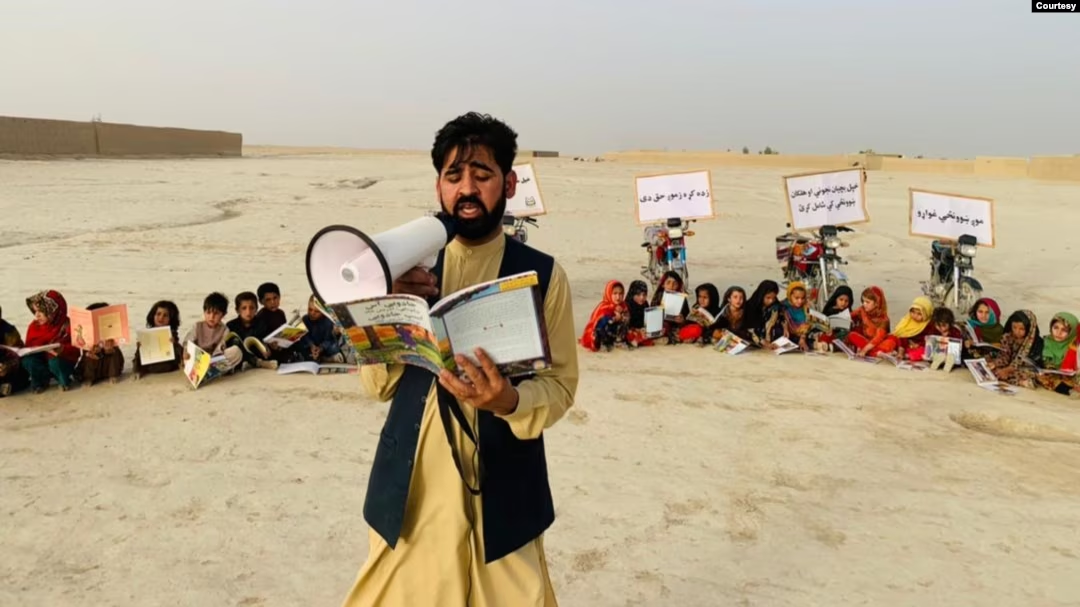Share
Human Rights Voices
While the UN devotes its human rights operations to the demonization of the democratic state of Israel above all others and condemns the United States more often than the vast majority of non-democracies around the world, the voices of real victims around the world must be heard.
Afghanistan, March 28, 2023
Taliban Detain Afghan Girls’ Education Advocate
Original source
The United Nations and relatives said Tuesday that de facto Taliban authorities in Afghanistan had detained a prominent advocate for girls' education.
Matiullah Wesa, the founder and head of PenPath - a community-based education support network - was picked up outside a mosque in the capital of Kabul after prayers on Monday evening.
Taliban security forces arrested Wesa "at gunpoint without any reason and drove him away to an unknown place," his older brother told VOA.
In a Pashto language video message on Twitter, Attaullah Wesa said that Taliban authorities had raided their home Tuesday morning and forcefully took away their two other brothers along with cell phones and other material. He said he was sharing the message from an undisclosed location to avoid arrest.
The Taliban have not commented on the arrest or on subsequent alleged actions against the detainee’s family.
The U.N. mission in Afghanistan called on the Taliban to clarify the whereabouts of Matiullah Wesa, along with “the reasons for his arrest” and ensure “his access to legal representation and contact with family."
Richard Bennett, the U.N. special rapporteur on the situation of human rights in the country, said he was alarmed by the arrest of the leading Afghan civil society member. "His safety is paramount & all his legal rights must be respected," Bennett tweeted.
Amnesty International demanded the Taliban immediately release Wesa, saying he "has peacefully advocated for girls' education" in Afghanistan.
Since taking control of the improvised war-ravaged South Asian country in August 2021, the Taliban have closed secondary schools for teenage girls and ordered most female government employees to stay home.
Last December, the hardline men-only Taliban administration suspended young women's access to university education and banned women employees of non-governmental organizations from workplaces.
Wesa's PenPath network, established in 2009, has been promoting education and schools for girls and negotiating with village elders in conservative Afghan society to allow their girls to go to school.
The network has hundreds of volunteers who help set up local classrooms, find teachers, distribute books and stationery and organize community gatherings in support of education for both Afghan boys and girls.
The Taliban ban on female education has dealt a blow to Wesa's campaign in support of education for boys and girls.
"We are counting hours, minutes, and seconds for the opening of girls' schools. The damage that closure of schools causes is irreversible and undeniable," he said on Twitter last week as the new school year started in Afghanistan. "We held meetings with locals, and we will continue our protest if the schools remain closed."
The Taliban reclaimed power as the United States and its Western coalition partners withdrew their troops from the country after almost two decades of involvement in the Afghan war.
The international community has since been pressing the Taliban to remove bans on women's access to work and education and respect civil liberties before granting legitimacy to the new government in Kabul.
Taliban leaders have ignored international calls, saying their governance is strictly in line with Afghan culture and Islamic law.
A deputy spokesperson for the U.S. Department of State on Monday criticized the Taliban edicts against women, saying they "fundamentally repress" the right of Afghan women and girls to seek education and to be able to participate in humanitarian activities.
"The Taliban is looking for more normal relations with countries around the world. That will not happen in a long time, so as they continue to advance these repressive edicts against women and girls," Vedant Patel told a regular news briefing in Washington.

